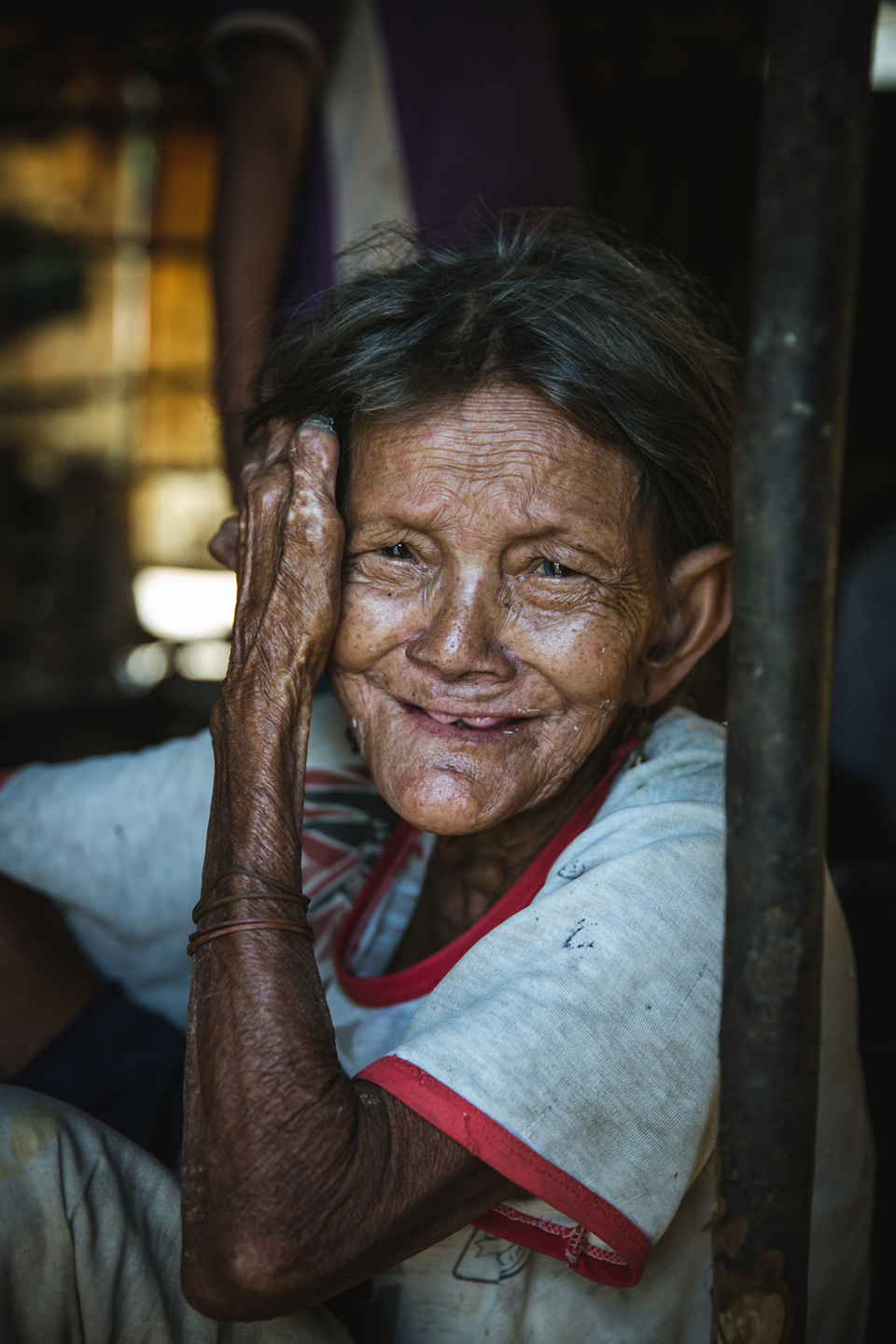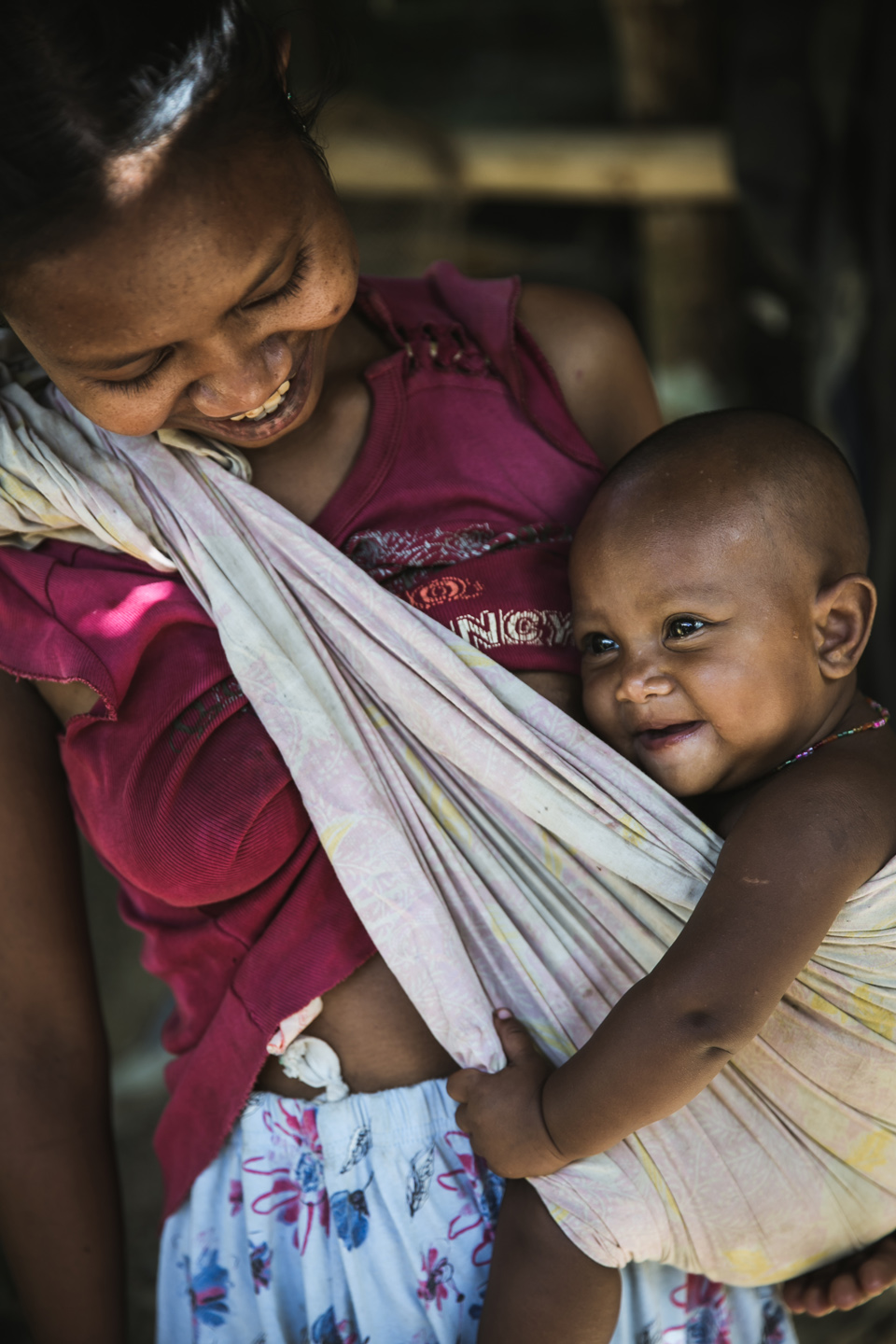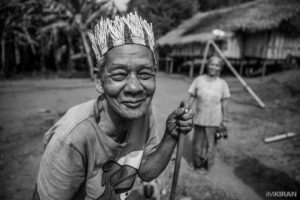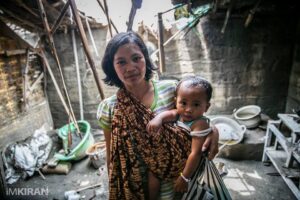
Sometimes I wonder that people should be able to take care of themselves or should be getting help from the local authorities as thats how it should be, or is it? Is one poor family in your area an issue, or a thousand families? What can one person do? Should this be my problem?
“The government will do something, it’s their responsibility.”
“Let an NGO do it, I’m sure they are helping with all the donations raised.”
Growing up, this thoughts were always on my mind too. As I only saw what was spoon fed to me by society, media & authorities. Or maybe it’s just my naive mindset, yes it was the conditioning, I was trained very well to sit when ask to sit, to stand when ask to stand. It took me while to see what changes can one person do, I remember in Philippines when I was put in direct contact with thousands of families suffering in poverty after the typhoon.
Then it was clear to me, one person can make a difference for another, just by being there. As a thousand humans starts with adding one human to another, even when I’m just a normal human being with nothing extraordinary, I was just present with them. So since then I decided to help create some awareness on this, even if it only helped one person. As I am also part of the human race. How can I allow another child to suffer with no food or shelter at night, while knowing about it. Is that child less important?
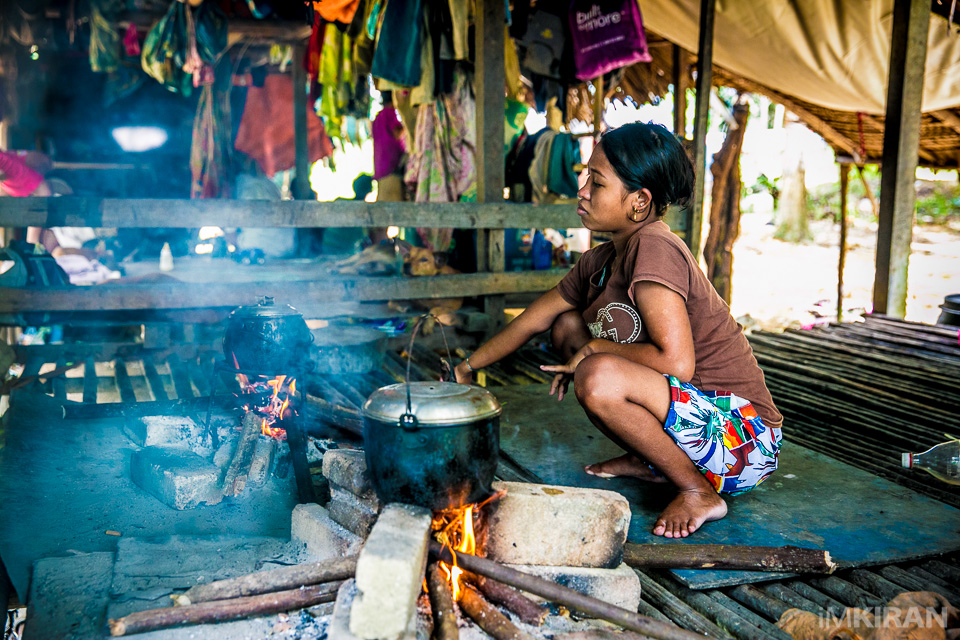
Here in the Kuantan, Pahang I met with Catherine, a lady that goes into 10-15 tribe villages for the last 13 years helping them as mush as she can. A single women that does it just because she can. She drives around with her semi trashed mini van into this jungles and off road areas just to visit and ask the tribes how are they doing. She gets help from the local church and friends, but that doesn’t matter as she decided that she wants to just help out. But how can she help? What can she do alone?
“A young orang asli girl today has just bought a new car, she came to show me, it’s a Myvi. She bought it after she got a better job. I’m happy she has a better life today.” – Catherine explains. Wow, that was it, she only needed to hear that to keep doing what she does.
We met about 50 Jakun tribe families living in the Muadzam Shah, far inside the oil palm plantation areas in Pahang. Mostly living with no basic needs. No proper homes (most of them had no walls or leaking roofs), no proper health, no electricity and no education. The children we hungry and had some kind of skin infection.
I spoke to one of the tribe elders.
“Why is the skin all infected?”
“We don’t know, maybe it’s the water or the food.”
‘Where do you get your drinking water from, you buy it or from the river?”
“We don’t, it’s from a well we dig around here. But it’s polluted now as we don’t dig deep. Even the babies and the children have the infections now.”
“Why do you not get help?”
“We have no money, and we can’t get government help as we stay far inside.”
“Why do you stay far inside?”
“They took our land, made it into plantations, so we moved further 2 years ago, don’t know how long we can stay here, what can we do. We worry we need to move again.”
“How about the rest that live nearby the cities that got some help?”
“We have no religion, so we don’t get help from authorities, we want to stay as Jakun people, we like living in the jungles.”
They live with no proper homes, no electricity, zero living aid, no medical care and no clean water to drink. They live far inside the jungles as they like it, ‘Kita orang Jakun, kita suka tinggal sini.” (We are Jakun people, we like living here). They like wooden houses, open soils and water from the earth. The least we can do for them is to help raise the awareness, get some solar lights and aid to them. It’s will be a good start to get the ball rolling.
The forest and rivers are a place where the orang asli (tribes) have been living for generations. Today it’s been taken aways from them for this kind of ‘development’ that only profits a small group but destroys generations.
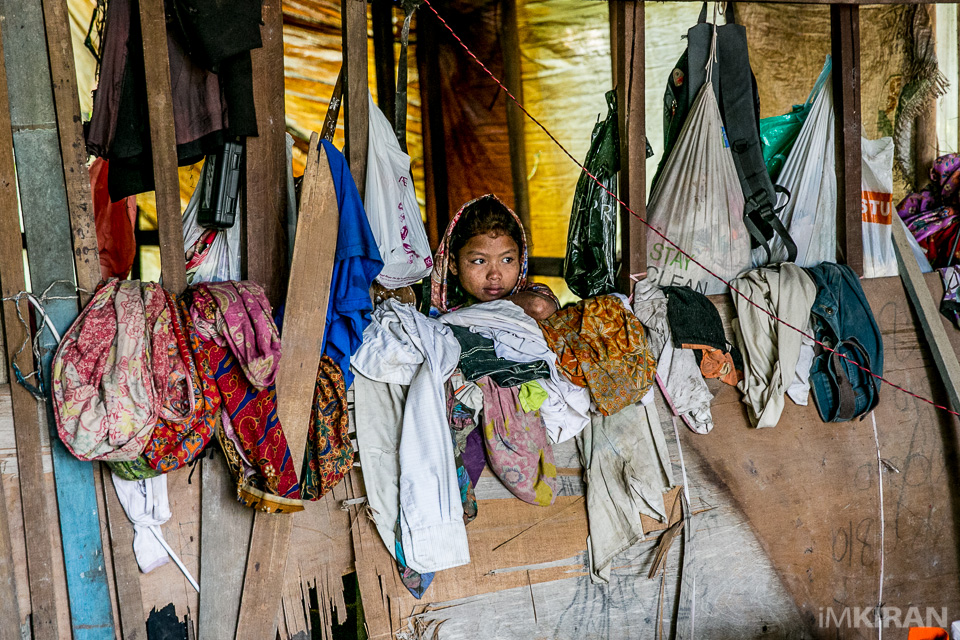
It does effect us, your roads are cracked today after landslides, your forest is been robbed and is bare naked, or only with oil palm fields with are full of chemicals (and not a nice scenery), your rivers are polluted and all because the Tribe do not live as they do.
The Tribes were the caretakers of our rivers, jungles and forest, they cleaned up after it as it was their home, they believed in it more than any of us. They used the rivers as a source of water so it was always clean, it was done out of love and passion. The same way you look after your homes in the cities. So today with the tribes gone from this forest after city folks have destroyed them, separated from families and not living as they do, the lands are getting destroyed as they are fighting this fight alone. So who is then taking care of the forest now? The care takers were force to leave their homes.
Let’s imagine this for a moment? A thousand Malaysians go into this jungles every month to visit with the tribes, to get to know them, give awareness to others, to giving them their homes again and to educate them about their rights, do you think this developers, governments or local politicians will easily take over their lands?
Now they will see the humans are getting together to protect the lands, they will feel your presence there, in the jungles and forest. When tribes get proper homes and a community again, with large populations living on this lands again, development will stop. The forest will grow again.
My first impression was that they don’t look like the tribes I’ve seen before in Philippines or Vietnam, this Jakun tribe looked more like poor jungle people living in fear and in their own filth. Is this the orang asli (tribe) culture today in Malaysia, I wouldn’t know

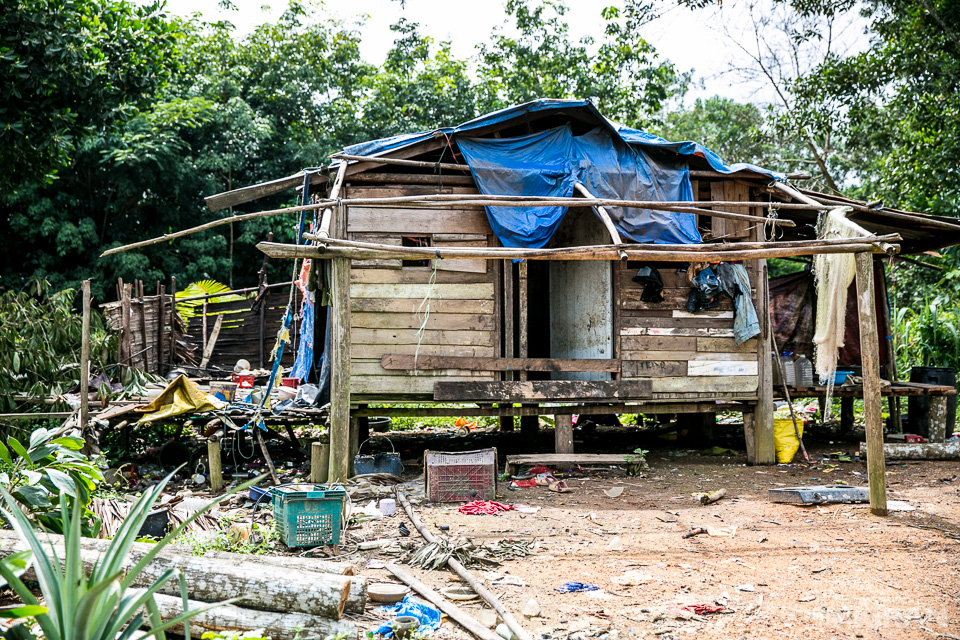
They had broken down houses that looked like they were put together in a day using scarp material from a nearby rubbish dump. The wood was from the fallen trees that they cut with the help of workers nearby. This is in Malaysia? No way! I wondered. It took me awhile to take it all in and start walking around the forest area visiting all the other families. They live far apart from one another, I am not really sure why but it seems like that each family had it’s group and they lived close by to support each other.


Mother were caring for their children or children from some others, the dads were sitting around smoking, some were away in the small farms, they grew vegetables that could be sold in the markets. Young man on old motorbikes would go out into the nearby towns to get odd jobs for daily income.
The women stayed back, sitting on the dirt grounds in a group playing cards, breast feeding their baby, cooking or just chatting. It was like I was back in the dark ages, where we were swamp by poverty. As in my mind the tribes lived happily in the jungles with the lands provided for them, wearing their traditional clothes, like in India, Thailand or Philippines, but here they were living around rubbish, polluted waters and poverty wearing left over torn clothes donated by outsiders.
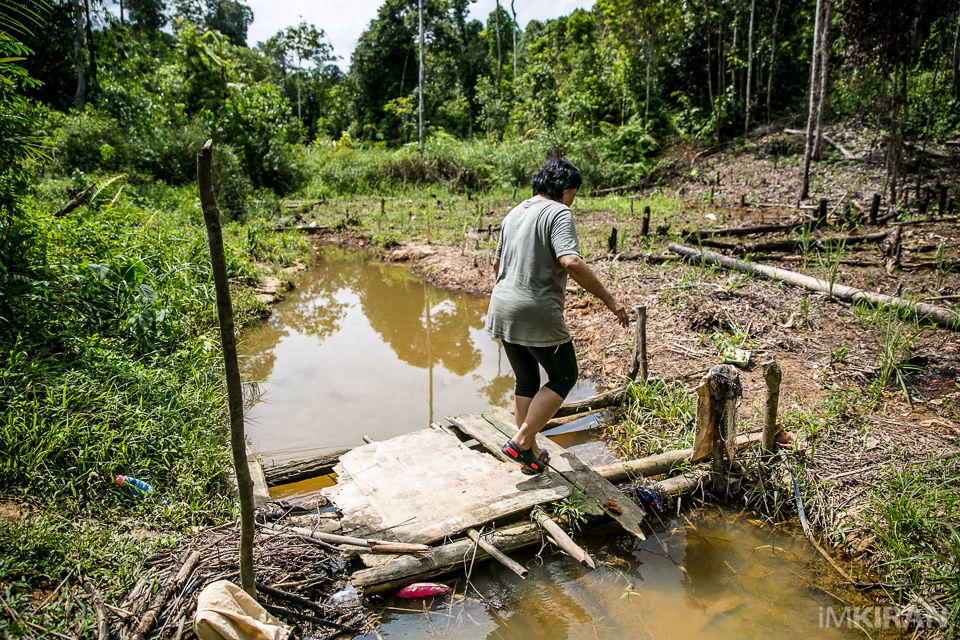
Catherine inspecting another water source of the Jakun tribe village here in Muadzam Shah, Pahang. They use this for their small farms, cooking, bathing and drinking. Yes drinking too. I didn’t know what to call it, a river, a drain or just a natural wonder.
They have plans to start farming more and dig a water hole but with being uncertain how long they can actually live here freely, the plan seems just to be. According to the tribes, the local authorities can come at any time to start a new oil palm plantation project here, and destroyed everything as how they did previously. So they have to move in further
She is one of the oldest living Jakun tribe women in this area. She was out farming when we arrived, we went around looking for her and had a little time spend to listen to her stories. She has not been feeling well, with some growth on her neck and she has alway been suffering with leprosy, mainly on her fingers. She is about 80 years old now, and she is beautiful to me.
I guess she is one of those who saw the changes happening in her tribal race and society. Changes that made the Jakun tribe loosing its tradition and ending up running further into the forest, change to the health of her tribe, change in seeing new diseases appearing and pollution happening in the waters and rivers. “Senyum senyum (smile) for the camera.” – Catherine


“I have this house for two years now, but we keep moving. I’m old now, so I’m not sure how long I can keep doing this. They keep taking our lands.”
This is one of the eldest of the Jakun tribe in the Muadzam Shah villages in Pahang. Living far inside the oil palm plantation areas in Pahang. Mostly living with no basic needs. No proper homes (most of them had no walls or leaking roofs), no proper health, no electricity and no education.
The Jakun tribe is being pushed away far inside the forest since oil palm estate developers keep cutting down the forest for new plantations. The local authorities and government in Malaysia does not seem to have a plan to protect the heritage or culture of this tribe.
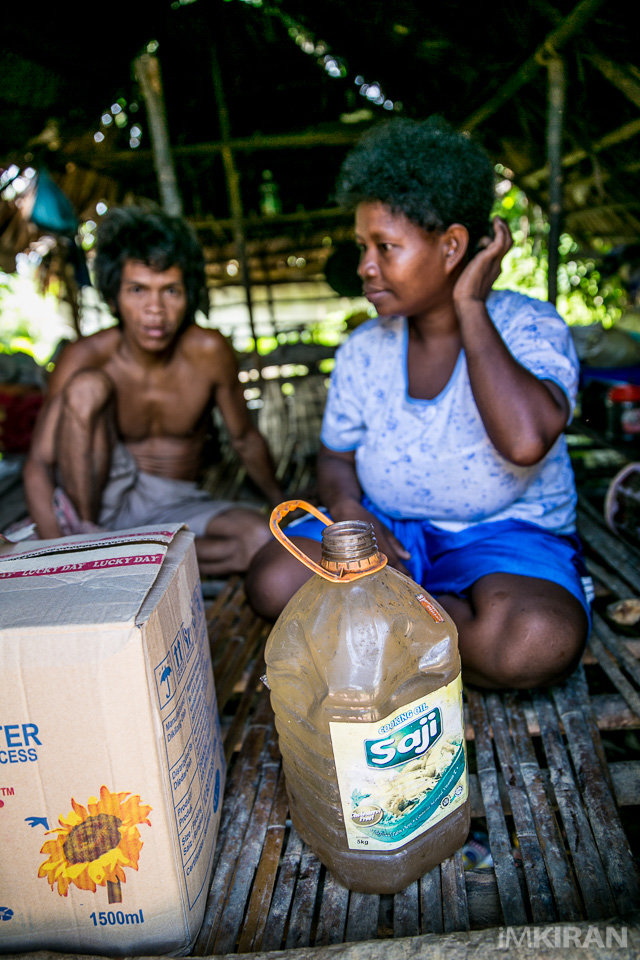
This is the drinking water. The brown dirty bottle filled with brown dirty water (unfiltered water for some). They had 10-15 bottles like this lying around the shelters. It was really disturbing to me on how can this people be surviving on this kind of environment. Mainly the children, they all had bloated stomachs, skin infections, bad teeth, sun burned, no clothes, it was just like a scene from Africa, that we see on Discovery Channel.



A father sits on the porch of his house, some go out farming and some stay home looking for odd jobs to do for their daily income.
So how will they ever live in one place peacefully, what is the solution? Private companies need land for plantations (even when there are a million palm trees in Malaysia), the tribes need land to live as they been always doing way before there where palm trees, so where do we find this balance for humanity today?
Share. Let the world know.
Shocking Conditions of the Jakun Tribe, Pahang

